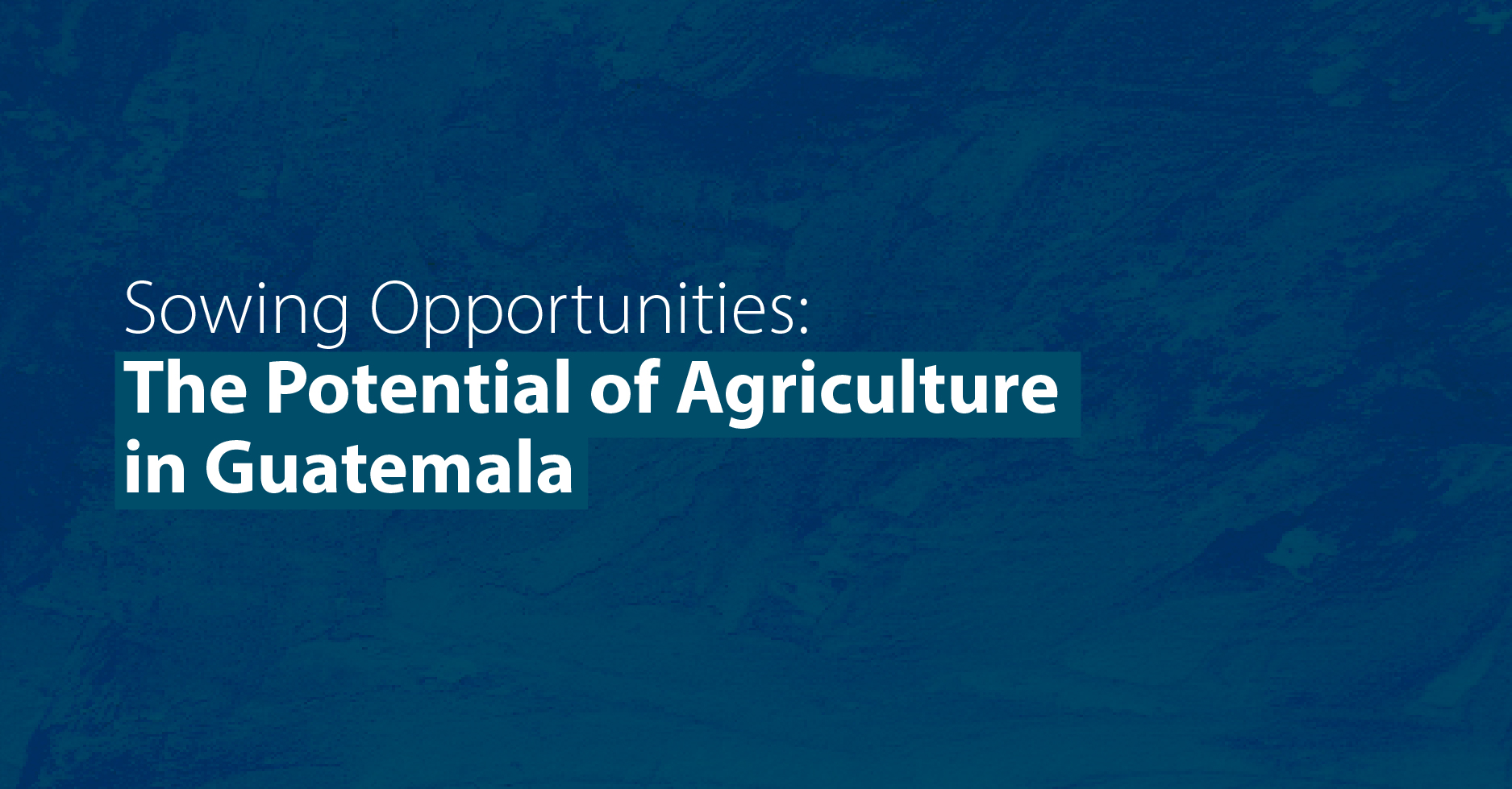Agriculture, in the heart of Guatemala, is intertwined with the country’s history, traditions and economic aspirations. Over the centuries, from ancient Mayan civilizations to modern farmers, Guatemalan lands have witnessed crops that have fed and clothed generations. This sector has not only sustained the national economy by being a primary source of exports, but has also formed an integral part of the country’s cultural identity, reflected in festivals, gastronomy and popular art. However, in the face of this rich heritage and relevance lies a scenario of untapped opportunities and unfaced challenges.
The actual magnitude and capacity of the Guatemalan agricultural sector, with its diversity of crops and microclimates, awaits to be fully recognized and developed. While nature has provided Guatemala with fertile lands and favorable conditions, it is human intervention through appropriate policies, legal reforms and sector-oriented fiscal structures that will determine whether the country can unlock the true agricultural potential that remains latent. It is a call to rethink and restructure, so that agriculture is not.
The weight of agriculture in the Guatemalan economy
Since the times of the Mayans, who developed advanced farming techniques and cultivated corn, cocoa, and chili peppers, among others, Guatemala has been an epicenter of regional agriculture. This veneration of the land and its fruits has persisted over the centuries, turning the country into an agricultural leader in Central America. Guatemala’s wide topographic diversity, from its coasts to its highlands, allows multiple microclimates to coexist, resulting in the possibility of producing a wide range of crops throughout the year. These geographical factors, combined with a long agricultural tradition, have led the sector to play a crucial role in the economic landscape, contributing significantly to the Gross Domestic Product (GDP) and the employment of thousands of Guatemalans.
However, it is essential to look beyond historical achievements and recognize areas of opportunity. Although agriculture has been a pillar of the Guatemalan economy, certain aspects still require attention. A renewed approach that increases crop production, introduces more advanced technologies, and adapts to changing demand patterns in global markets is needed. Training farmers and investing in research and development are crucial to taking Guatemalan agriculture to the next level. Furthermore, a robust legal framework adapted to the current needs of the sector is essential. This framework must not only protect farmers’ rights but also incentivize sustainable practices and promote inward investment, thus maximizing Guatemala’s agricultural potential.
The investment cycle in agriculture
When talking about the investment cycle in agriculture, we refer to a series of sequential and interconnected phases that make up the complete process of agricultural activity. These stages range from soil preparation, acquisition of seeds and other inputs, through planting, growth, care, harvesting, and finally, post-harvest, which includes processing, storage and sale. Each phase has specific characteristics and, therefore, different economic requirements. Investment is not static; it varies depending on the stage of the cycle. For example, the growth stage may require investment in seeds, seedbeds, irrigation, fertilizers and pest protection, while the post-harvest stage may focus on storage, processing, and logistics.
The dynamism of these cycles has a direct impact on the workforce. At certain times of the year, the demand for workers may be higher, such as during harvest times, where speed is essential to avoid losses. On the other hand, during the growth stages, when monitoring and constant care are required, the work is less intense. This fluctuation in job demand has the potential to revitalize local economies. The proper management of peaks in labor demand can establish properly managed seasonal employment patterns can be established that, despite their temporary nature, offer workers a more predictable source of income. Furthermore, higher employment in rural areas counteracts migration to urban areas and abroad, strengthening the local economy and allowing rural communities to maintain and develop their social and cultural fabric.
The need for tax reform for the agricultural sector
The agricultural world operates under unique seasonal dynamics, where each phase, from land preparation to harvesting, requires specific financial and temporal investments. However, the current Guatemalan tax scheme does not seem to reflect this intrinsic reality of the sector. The tax structure, in its traditional design, imposes uniform charges throughout the year and during the production process without considering that farmers’ income fluctuates according to harvest seasons and investment processes in the agricultural sector.
This mismatch between the timing of taxation and agricultural revenue streams leads to significant financial challenges. For example, a farmer may find himself in the position of having to pay taxes at a time when he has not yet earned income from his crop. This inconsistency can lead to debt, early sales at non-optimal prices, or even bankruptcy.
The proposal for a reform that contemplates tax deductions or adjustments depending on the phase of the agricultural cycle does not seek to grant undue privileges to the sector, but rather to level the playing field. By adapting the tax system to the agricultural reality, the particularities of an industry essential for the country’s economy and food security would be recognized and valued.
In this sense, an adaptive tax regime could consider, for example, grace periods at times of higher investments or deductions for purchasing sustainable and renewable technologies. These adaptations would not only support farmers’ financial stability, but would also incentivize more efficient and sustainable agricultural practices. Any investment in agriculture benefits farmers and the country.
Therefore, it is essential that tax legislation evolves into being representative and fair, reflecting the particularities and challenges that the agricultural sector faces on a daily basis. Modern and adapted tax regulations will not only strengthen the position of farmers but also encourage investment and innovation in the countryside, thus boosting Guatemala’s full agricultural potential.
When evaluating fiscal policies from a short-term perspective, there may be concerns that modifying the tax system based on agricultural cycles could reduce the immediate revenue of the State. However, it is essential to recognize that the economic and fiscal health of a country is not measured solely by its short-term income, but by its ability to guarantee sustained and balanced growth over time.
An industry not hampered by disproportionate fiscal burdens in its most vulnerable stages will have a greater capacity to reinvest in technologies, infrastructure and human capital. These investments, in turn, enhance the productivity and competitiveness of the sector on the national and international stage.
Additionally, farmers facing reduced tax pressure at critical times are more likely to feel incentivized to formalize their activities, expand their operations, and explore new markets. Greater formalization means a broader tax base, which will eventually translate into a higher capture of resources by the State.
Beyond mere collection, a dynamic and growing agricultural sector has a multiplier effect on the economy. The demand for inputs, services and labor increases, boosting other sectors and generating employment. At the same time, prosperous agriculture guarantees food security, reduces dependence on imports, and boosts exports.
In summary, adapting taxation to agricultural realities not only translates into a more resilient agricultural sector, but also a more dynamic and stable economic environment. The long-term vision must prevail over immediate considerations, and Guatemala has the opportunity to lead a change that will benefit farmers and lay the foundation for more inclusive and sustainable economic development.
Nurturing Guatemalan agriculture is not only a matter of tradition or culture, but also economics and tax justice. Establishing legal frameworks and fiscal incentives adapted to farmers’ needs to show a more prosperous future, not only for the agronomic sector but also for the entire country. The time to recognize our agricultural potential and act on it is now.
Rodolfo Salazar
Partner
Guatemala
E-mail




